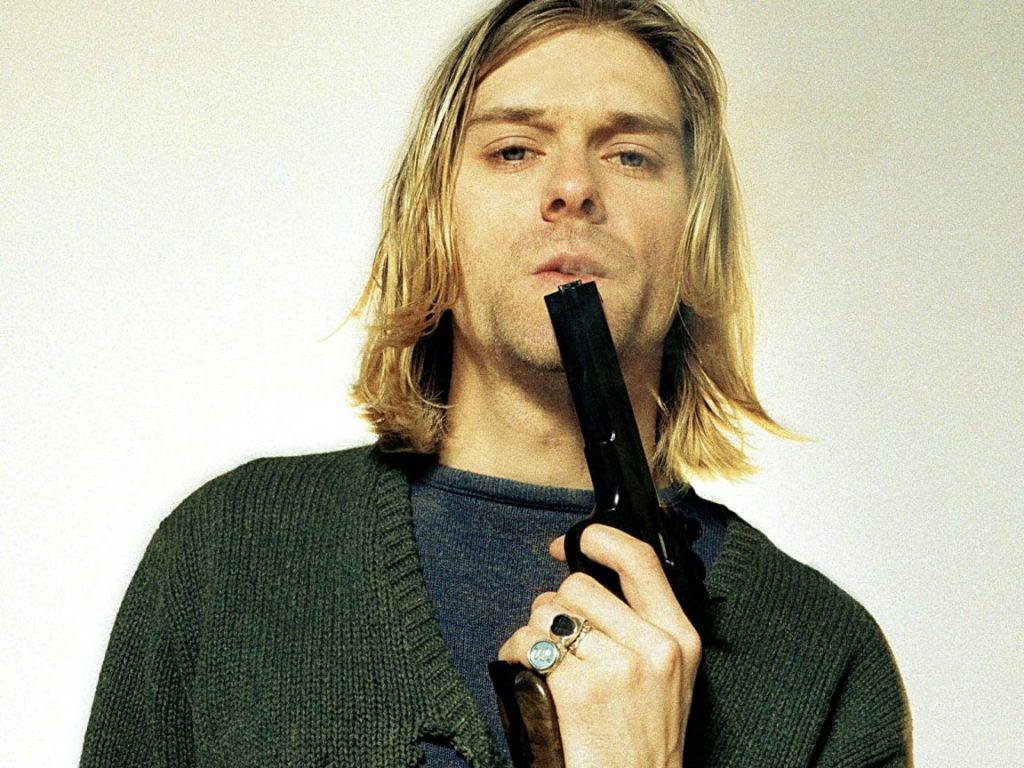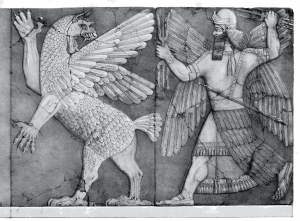“I’m not afraid of dying. Total peace after death, becoming someone else is the best hope I’ve got.” This statement made by Nirvana front-man Kurt Cobain reflects both the self-loathing and general sorrow, or anguish, that he felt he was constantly suffering from and ultimately what led to the tragic event that occurred on April 5, 1994. Kurt Cobain, the lead singer of the band Nirvana, was born in Hoaquiam, Washington on February 20, 1967.1 Few honestly know of the struggles Kurt had to endure in his life, such as his parents’ divorce when he was about nine. This break-up resulted in Kurt losing a permanent place of residence, leaving him in a constant state of borderline homelessness. As a matter of fact, Kurt even resorted to staying at the hospital where he was born around the age of nineteen.2 Regardless, Kurt still managed to climb from rock bottom to become the star he was: the lead singer of Nirvana and the face of grunge music for many people worldwide.

Of course, Nirvana didn’t come straight out the gate making hits nor score international shows. The band Nirvana actually had quite a macabre or fuzzy rise in comparison to other bands. Interestingly enough, Nirvana didn’t even start off being called Nirvana. This small trio actually bounced around with abstract names for quite a few years. From their humble beginnings in Aberdeen, Washington, in 1987 the band was known as Skid Row, Pen Cap Chew, and Bliss all within the same year.3 They played a few house parties and even fewer shows at real venues around the Aberdeen area, but the band life was more of a hobby to the group. They had fun doing what they did, played their hearts out when they had to, but they didn’t really think they were going to be anything huge when they first started out.
The group may have started small, but the effort and time they put into the band would soon enough pay off. In 1989, they released their independent album Bleach, which got them a lot more shows in lots of new places. The band finally started “blowing up” and gathering many followers nationwide. With this newfound momentum, Nirvana signed with Geffen Records and released their second album Nevermind, which has since become legendary. This was just two years after their first independent album Bleach was released.4 Nevermind kicked off Nirvana’s international rise to a new high, scoring them not only shows around the country, but in other countries as well. Nirvana went global and this new, dissonant, and muddy type of rock music started receiving mainstream recognition. This new and quickly popular genre became known and recognized as grunge, a form of punk rock with the muddy sounds of post-punk mixed with a sprinkle of youthful angst.5 This new genre became the sound of the ’90’s, with many bands such as Soundgarden, Pearl Jam, and Alice in Chains riding the wave. But for many worldwide, songs such as “Smells Like Teen Spirit” or most of the songs from Nirvana’s Nevermind album became grunge anthems that depicted the youthful rebellion and dissonance reflected in grunge music.6

Although Nirvana was finally blowing up and rising to international fame quickly, the lead singer Kurt Cobain was still not truly satisfied with his life. Throughout his life, Cobain constantly suffered from stomach illnesses. In response to this constant illness, Kobain would abuse drugs like heroin, claiming it would cure this problem. Even worse, when Kurt met his soon to be mother of his child Kourtney Love, his heroin abuse only got worse.7 With more money and fame, his addiction grew stronger and the pressures of fame and fortune began mounting on his shoulders, until one day it was just too much. In 1994, while on tour in Europe, Kurt had to be hospitalized for drug overdose and other health issues including alcohol problems. Soon after, he was forced to cancel the tour and return back home to Seattle. His family and friends decided to stage an intervention and convince him to admit himself into rehab, much to his displeasure. This rehabilitation did not last long, as Kurt decided to flee the rehab center and return back home to Seattle, tragically unbeknownst to his family and friends. On April 8, 1994, an electrician found Kurt Cobain’s dead body in a room above the garage above his home where he was hiding out at.8 The cause of death was a self-inflicted shotgun blast to the head, and even worse, heroin was found in his system so it’s not even clear if Cobain really meant to do that to himself or if the drugs influenced him to do so.9
Cobain’s inconceivable and unanticipated death resulted in worldwide mourning over the loss of this young artist’s life. Family and friends, especially his girlfriend and daughter, were heavily affected by this tragedy, as well as all of his listeners. Cobain was an icon for Generation X. He gave voice to the youthful generation of people that felt they were dealt a bad hand. He encouraged the generation, and became “the poster boy for grunge.” After Kurt’s death, the grunge scene died down quickly. Of course, there were still other bands in the genre putting out a few successful albums, but the genre never saw the fame and glory it had during its heyday in the early ’90’s, when Nirvana was contributing to the movement.10 The genre died out as quickly as it was born, with the untimely and very unfortunate death of a very talented and tormented young artist.
- Salem Press Biographical Encyclopedia, 2013, s.v. “Kurt Cobain,” by Delbert S. Bowers. ↵
- Nick Soulsby, I Found My Friends: The Oral History of Nirvana (New York : Thomas Dunne Books/St. Martin’s Griffin, 2015). 7. ↵
- Salem Press Encyclopedia, 2013, s.v. “Nirvana (music),” by Alan Haslam; Nick Soulsby, I Found My Friends: The Oral History of Nirvana (New York : Thomas Dunne Books/St. Martin’s Griffin, 2015), 1-18. ↵
- Salem Press Encyclopedia, 2013, s.v. “Nirvana (music),” by Alan Haslam. ↵
- Baker’s Biographical Dictionary of Popular Musicians, 2004, s.v. “Grunge: A Brief History of a Hard Rock Genre,” by Gil Kaufman. ↵
- Baker’s Biographical Dictionary of Popular Musicians, 2004, s.v. “Grunge: A Brief History of a Hard Rock Genre,” by Gil Kaufman. ↵
- Salem Press Biographical Encyclopedia, 2013, s.v. “Kurt Cobain,” by Delbert S. Bowers. ↵
- Salem Press Biographical Encyclopedia, 2013, s.v. “Kurt Cobain,” by Delbert S. Bowers. ↵
- Salem Press Encyclopedia, 2013, s.v. “Nirvana (music),” by Alan Haslam. ↵
- Baker’s Biographical Dictionary of Popular Musicians, 2004, s.v. “Grunge: A Brief History of a Hard Rock Genre,” by Gil Kaufman. ↵



112 comments
Addie Piatz
I use to hear Nirvana song and I knew the words but i didn’t know it was Nirvana. When i found out it was them i listened to them more and more. Kurt’s story breaks my heart every time i read it. He was such an amazing artist and song writer. His band and him had sone of the more iconic songs.I enjoyed learning something new about them. I didn’t know they changed their name so many times and i even recognized one of the names.
Nelly Perez
There was only one song I heard from Nirvana so I hardly listened to them. This was interesting to read. I didn’t know that they changed their names three times. Sad to hear that he had resorted to drugs and was not satisfied with his life. He could not handle having a daughter and avoid drug abuse.
Priscilla Poorbaugh
Nirvana is such an iconic band. I feel like it is super common for musicians to have addictions. He was already depressed and in physical pain so I’m sure all the band pressure didn’t help. If only he had gotten the help he needed sooner, but also you can’t really save someone who doesn’t want to be saved. His music will live on forever.
Eloy Cruz
I have only heard a few songs from Nirvana, I was never really a fan of the music genre. I have also heard the name Kurt Cobain but I never knew who it was. I didn’t even know that Nirvana’s lead singer had passed away more than 20 years ago. Kurt Cobain’s story is a really influential one to those that can be suffering with some sort of addiction, and I honestly don’t know if everyone knows Cobain’s story or I have just been under a rock this entire time, but everyone who suffers with some sort of discomfort in their lives should read Kurt Cobain’s story.
Judson Ruddick
The story of Kurt Cobain is truly tragic and hits close to home for me. He committed suicide several years before I was born so I never got to live in a world where he was alive and making music. He had a beautiful musical mind but he was tortured by his own demons and used music to fight them until music itself became one of his demons. This article feels a bit superficial when addressing what he was going through. The mention of his actual relapses with drugs and how that affected his relationship with the band would have added more depth to this article. Overall it feels like something someone could learn by just searching Kurt Cobain on google and clicking the first link they find.
Kasandra Ramirez Ferrer
I had never heard of Nirvana before but I can say from the article that they must be a great band. I have heard of a lot of bands that had struggled when they were growing and when they were already successful, must of these bands don’t usually survive and break apart. However, Nirvana had its struggles and still made a fantastic work which is still listened to today.
Mia Correa
First of all, I LOVE Nirvana and the music they produce. “Smells Like Teen Spirit” is a classic, no doubt. Even though some people think Curt could’ve been saved if you listen to his lyrics, I believe if someone wants to die, there is no saving them. There is only attempts to make them see what their life is worth but it’s up to them and their mental state to deem their own life worthy.
Jacqueline Mendez
I love Nirvana. It’s one of the first-ever bands I listened to. Nirvana helped me get out of dark place in my life when I was in seventh grade. Kurt’s death was truly tragic for this band. They had so much more success to achieve. The band’s life was cut very short and in such a tragic way. It is horrible how no one ever saw how much he needed someone there not just rehab. An angel then and an angel now.
Vania Gonzalez
I really enjoy learning about people and their struggles especially artists and musicians. Because they all have such interesting backstories and these stories brought us what we now have in music. Nirvana is probably the most interesting because they had a struggle like no other band and then when they really found their style that’s when people became interested.
Ariana Brown
Nirvana is an amazing band. I was unaware that their first album was called Bleach. His daughter, Francis Bean, named the documentary about his life and death, “Soaked in Bleach” which makes me wonder if it was a nod to that album. I wish he had left journals or something so we could have more ideas into his reasoning and his mind during rehab. Then it would be easier to see if the drugs influenced his behavior and what his thoughts were beforehand.